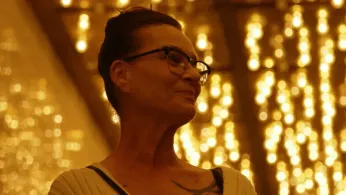
3 hours ago
Susan Powter: From Fitness Icon to Proud Lesbian and Life on Her Own Terms
READ TIME: 3 MIN.
Susan Powter, once a household name in the fitness world and a fixture on 1990s television, has re-emerged in the public eye with candid reflections about her sexuality, her life after fame, and her perspective on personal independence. Powter, now 67 and residing in Las Vegas, shared her story in a new Entertainment Weekly interview and in the documentary “Stop the Insanity: Finding Susan Powter, ” executive produced by Jamie Lee Curtis. Her openness about her journey as a lesbian and her reflections on aging, identity, and resilience offer valuable insights for LGBTQ+ communities and beyond .
In the early 1990s, Susan Powter became a pop culture phenomenon. Her infomercials, books, and talk show promoted health, nutrition, and empowerment, famously urging viewers to “Stop the Insanity! ” Powter’s brand at its peak was worth hundreds of millions of dollars, and her advice on fitness and lifestyle made her an influential figure for women nationwide .
However, her meteoric rise was followed by a dramatic fall. By 1995, Powter’s business empire collapsed amid bad financial advice, litigation, and bankruptcy. She lost control over her brand and found herself struggling financially—eventually working as an Uber Eats driver and living in a modest apartment in Las Vegas. Powter has spoken openly about this reversal of fortune, emphasizing personal responsibility and the lessons learned from her experiences .
Recently, Susan Powter has spoken with clarity and pride about her identity: “Now I’m a huge lesbian. Total lesbian, great love affairs, many girlfriends, big fun. Best fun ever! ” she told Entertainment Weekly, while also emphasizing that she no longer dates and has no interest in marriage or cohabitation. Powter describes herself as “a very isolated person, ” preferring solitude and the company of her three sons—two biological, one adopted—over romantic relationships .
Powter’s journey toward self-acceptance was not without challenges. She was previously married to men, including musician Lincoln Apeland and Nic Villarreal, with whom she had two sons. After her marriages ended in divorce, Powter faced public scrutiny and legal battles, including a defamation lawsuit against Apeland. Her coming out as a lesbian marked a turning point, both personally and in her relationship with her family. She has since maintained close ties with her children, seeing them as her primary source of social connection .
The new documentary “Stop the Insanity: Finding Susan Powter, ” directed by Zeberiah Newman and executive produced by Jamie Lee Curtis, chronicles Powter’s extraordinary life. The film explores her rise to fame, her financial downfall, and her subsequent reinvention. It highlights the challenges faced by older women and LGBTQ+ individuals in a culture that often marginalizes them, particularly when they are no longer at the center of public attention .
Curtis described the film as “an indictment of how we discard human beings as they get older in this country, ” underscoring its broader social significance. Powter, interviewed in the documentary, reflects on finding recordings from her old talk show and repudiates her past advice about dating men. “I’d never do a segment like that. I’d never talk about that. I don’t care if you meet a man, and I don’t think most women should meet a man, ” she says, reinforcing her current values and perspective .
Powter’s story resonates with many in the LGBTQ+ community, particularly older adults, by challenging stereotypes and demonstrating the importance of living authentically at any age. Her willingness to speak openly about her sexuality, financial struggles, and the realities of aging offers representation that is often lacking in mainstream media. The documentary and recent interviews frame her journey as one of resilience, self-acceptance, and defiance against societal pressures to conform or disappear with age .
Her story also highlights the intersecting challenges faced by LGBTQ+ elders, including isolation, economic instability, and the need for community support. Advocates point to the importance of visibility and the celebration of diverse life stories as vital to combating ageism and fostering inclusion within and beyond the LGBTQ+ community .
Susan Powter’s current life is marked by independence and authenticity. While she no longer enjoys the material wealth or fame of her earlier years, she expresses contentment with her identity and choices. “You want my opinion on it now? Lesbian, all the way! ” Powter declares, illustrating her commitment to living truthfully .
Her journey stands as a testament to the power of reinvention, the importance of self-acceptance, and the ongoing fight for dignity and visibility for LGBTQ+ people of all ages.






